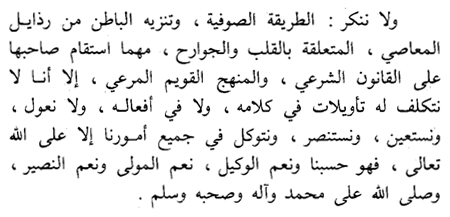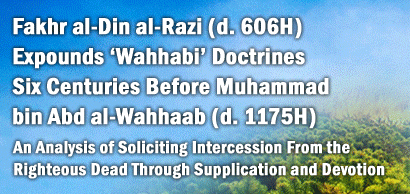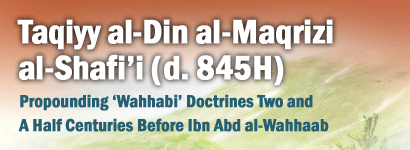 |
You are here:
Home  General
General
Shaykh Abd Allaah Bin Muhammad Bin Abd Al-Wahhaab: We Do Not Reject the Sufi Tariqah in Purifying the Soul
Posted by Abu.Iyaad, Editor in General
|
 |
Shaykh Abd Allaah bin Muhammad bin Abd al-Wahhaab stated in a treatise he wrote after 1218H as occurs in al-Durar al-Saniyyah (1/241):
 And we do not reject the Sufi tariqah (way) and purifying the inner-self (the soul) from the impurities of disobedience which are connected to the heart and limbs, so long as its adherent is steadfast upon the Shariah law and the upright, compliant methodology, except that we do not start making explanations (ta'weels) for his speech and his actions. And we do not depend, seek aid, seek support, and rely, in all of our affairs, except upon Allaah, the Exalted. For He is sufficient for us, an excellent disposer of affairs, an excellent master and an excellent aider, and prayers and salutations be upon Muhammad, his family and his companions. And we do not reject the Sufi tariqah (way) and purifying the inner-self (the soul) from the impurities of disobedience which are connected to the heart and limbs, so long as its adherent is steadfast upon the Shariah law and the upright, compliant methodology, except that we do not start making explanations (ta'weels) for his speech and his actions. And we do not depend, seek aid, seek support, and rely, in all of our affairs, except upon Allaah, the Exalted. For He is sufficient for us, an excellent disposer of affairs, an excellent master and an excellent aider, and prayers and salutations be upon Muhammad, his family and his companions.
Notes
Sufism started initially in Basrah amongst the Tabi'een as an exaggeration in the fear of Allaah, and it was disapproved of by the likes of Imaam Ahmad in his time (when it appeared in al-Haarith al-Muhasibee annd those like him) due to his insight and perspicacity in knowing where it may lead to. But even in that period, it had not reached the great misguidance it was to ultimately end in. This is because the original Sufism (simple exaggeration in fear of Allaah and in matters of piety and awe of Allaah) developed further by being poisoned with kalaam and falsafah (philosophy) and the esoteric mysticism and gnostic illuminism (higher knowledge through spiritual practice) which in reality came from the direction of Greek philosophy which had been entered into Islaam through the Baatiniyyah. Thus, by the time al-Ghazali came along and wrote works not free of the poison of the Baatiniyyah and Falaasifah whose books he had been delving into, tasawwuf meant something completely different to what it was in Basrah at the turn of the first century hijrah which was excessive fear of Allaah without departing from anything in the Shariah or traversing upon innovated doctrines, or practices, and claiming to receive "higher illumination" through them.
What Shaykh Abd Allaah, the son of Muhammad bin Abd al-Wahhaab is pointing out here that they (the Unitarian reformers) do not reject the notion of a "Sufi tariqah," meaning by that, a method for the purification of the soul from disobedience and its effects, since that is requested, legislatively, however only so long it is founded purely upon the Shariah law and upon a sound methodology that is compliant with the Shariah. Effectively this means adhering strictly to the Sunnah of the Messenger in matters of worship, remembrance, forgiveness, piety, righteousness and so on and not departing from any of that, since what has come in the Shariah is sufficient to bring about purification of the soul and the heights of spirtuality. So when there is no innovation and no departure from the Shariah, then in principle, the notion of purification of the soul is not rejected. As for the Sufi Tariqahs present in general such as what we find of their names and labels and divergent paths, they are not free of what opposes the Shariah in belief, methodology or practice and many of them contain great heresies such as the doctrines of wahdat al-wujood and gnostic illuminism and other such affairs, as well as innovated forms of worship (such as dancing and singing) and worship performed in a manner that departs from how it is in the Sunnah, and pledges of allegiance which are innovated and have no basis in the Shariah.
The intent here in presenting this particular quote is to highlight the false propaganda and intellectual terrorism used by the adversaries and opponents of the monotheistic reform movement at its time to malign and misrepresent the actual views and positions of its leaders, such as Ibn Abd al-Wahhaab and his offspring.
Link to this article: Show:
HTML Link •
Full Link •
Short Link
Share or Bookmark this page: You will need to have an account with the selected service in order to post links or bookmark this page.







|
|
|
Add a Comment
You must be registered and logged in to comment.
|
 |




|
 |
 General
General



 And we do not reject the Sufi tariqah (way) and purifying the inner-self (the soul) from the impurities of disobedience which are connected to the heart and limbs, so long as its adherent is steadfast upon the
And we do not reject the Sufi tariqah (way) and purifying the inner-self (the soul) from the impurities of disobedience which are connected to the heart and limbs, so long as its adherent is steadfast upon the 








